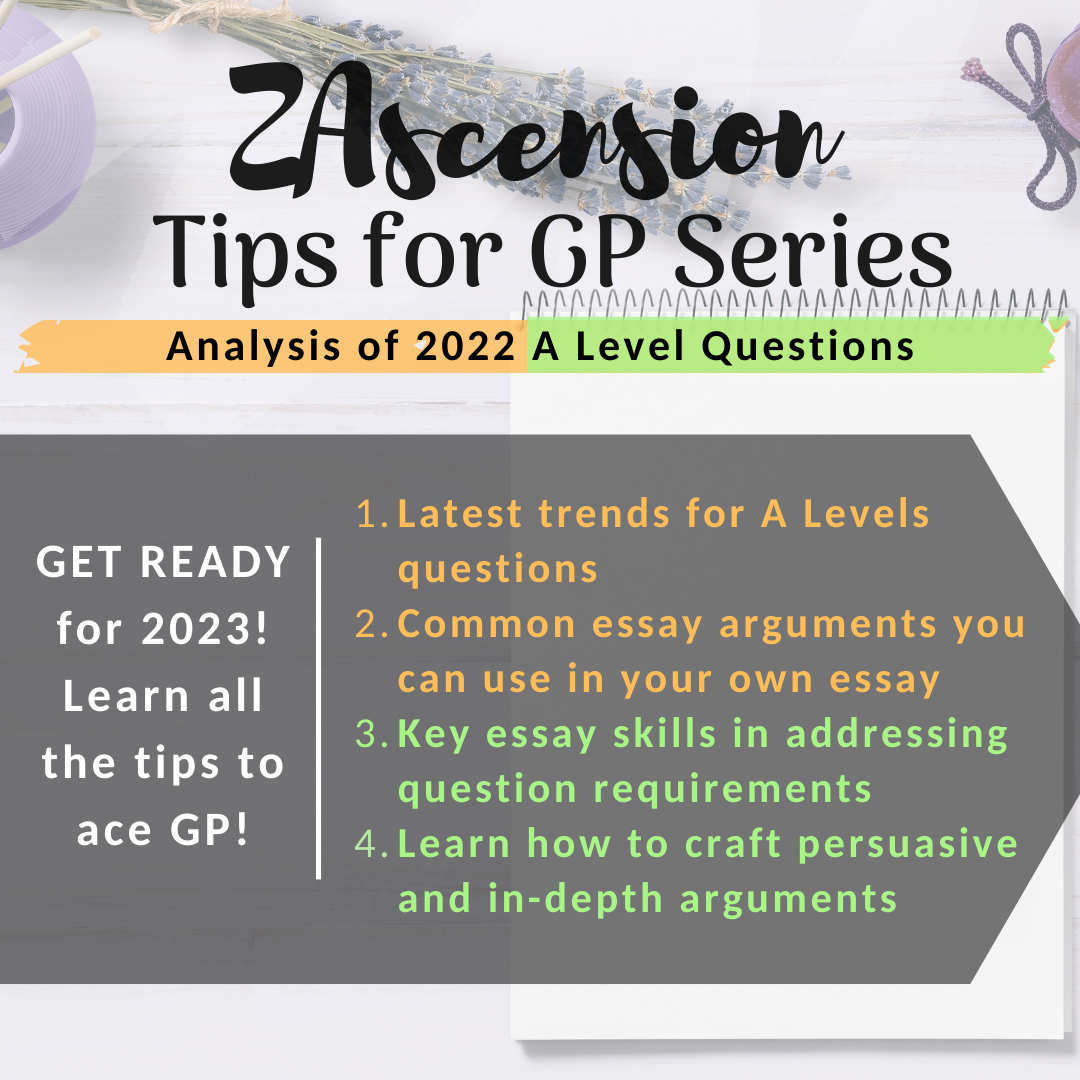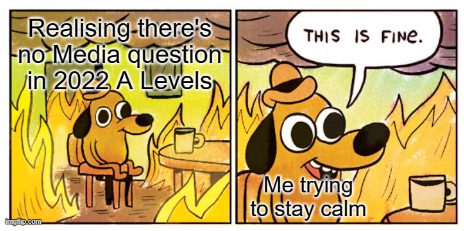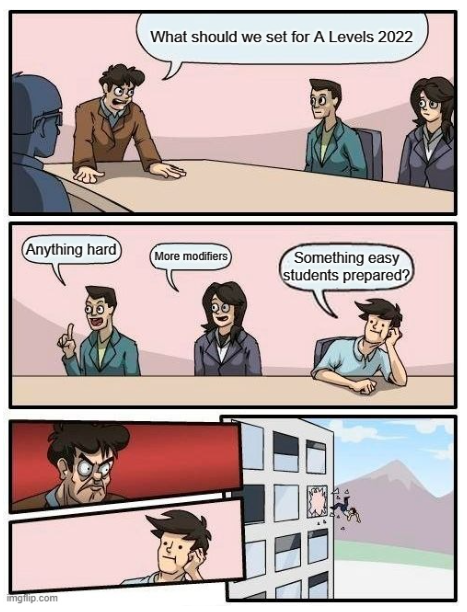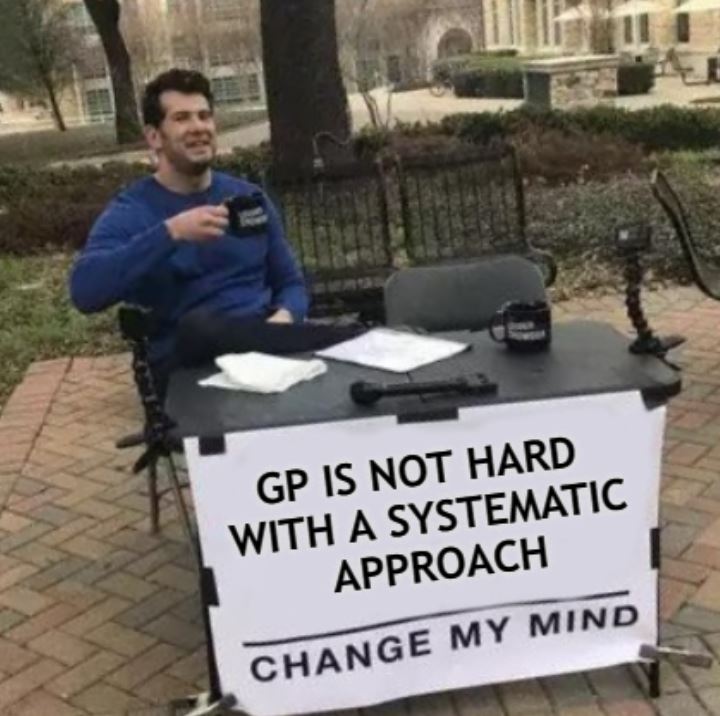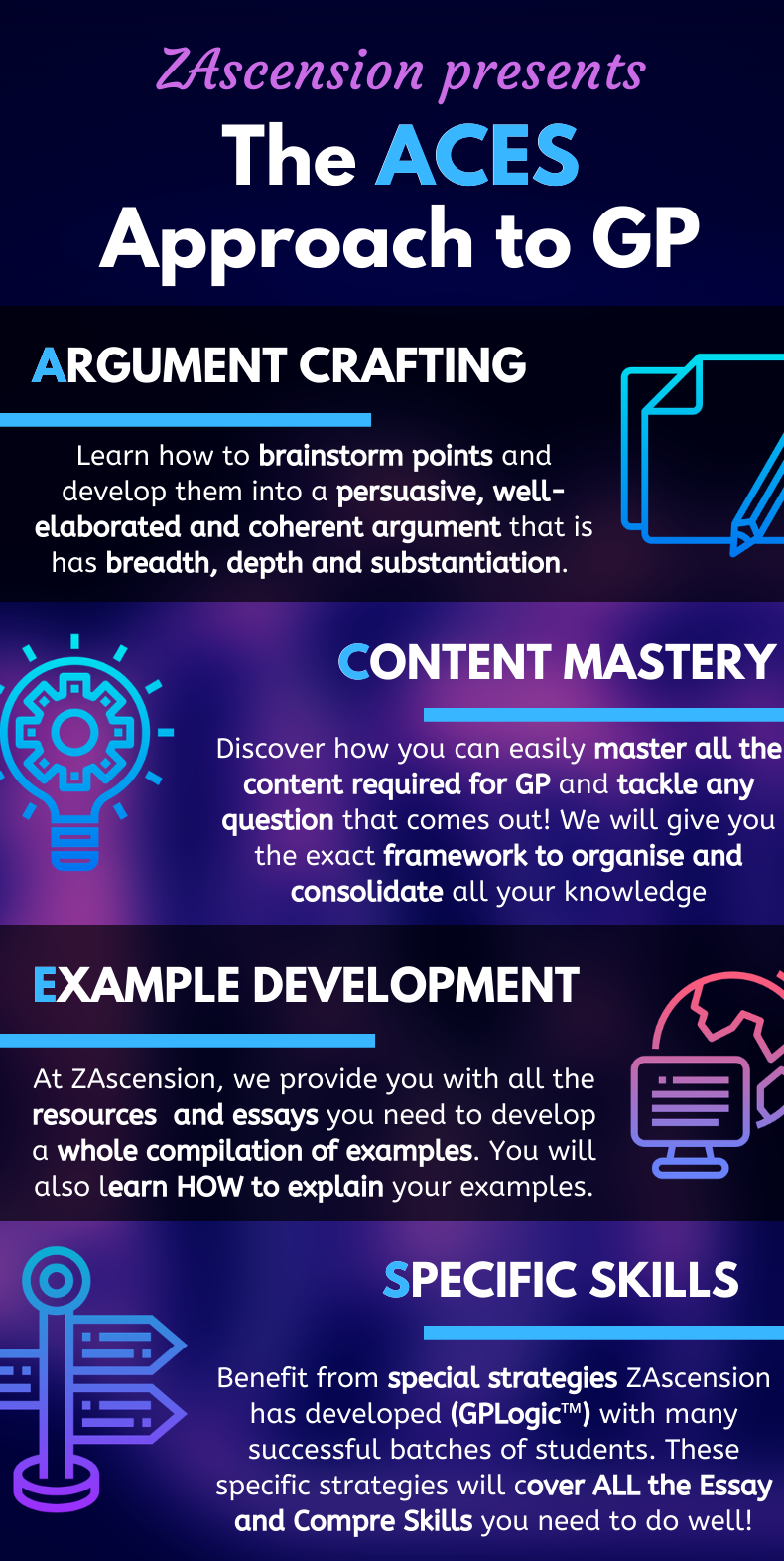GP Essay Questions from 2022 A Levels
1. Consider the view that people imprisoned for crimes should lose all their rights.
2. Does religion still have a role in the modern world?
3. ‘Dramas on television or film are never as effective as a live performance.’ Discuss.
4. Assess the extent to which different age groups in your society are valued equally.
5. To what extent can individuals shape their own lives when the world is so unpredictable?
6. ‘Too many historical figures are famous for the wrong reasons.’ Discuss.
7. The results of scientific research should be available to everyone.’ How far do you agree?
8. Examine the claim that music without words lacks both meaning and appeal.
9. Since the extinction of species is a natural phenomenon, is there any point in trying to prevent it?
10. ‘Consumerism is more of a curse than a blessing. How true is this of your society?
11. Consider the view that mathematics is of little interest to most people as it is too complex.
12. ‘It is not winning, but taking part, which matters.’ How acceptable is this as an approach to life?
Poll (Which question did you attempt): Click here to indicate!
Poll Results: Click here to view the results!
If you want more Tips for GP, do also join this free Telegram channel which would share very helpful Tips, FAQs, and update you when articles are updated/posted 😃
______________________________________________________________________________________________________
General Insights:
Why do A Levels Essay Questions always seem so much more difficult that Practice/Prelim ones? Is it true that they are more difficult? The good news is they are actually easy if we analyse them and think about the strategies!
Strategies = Content + Skills. This two-pronged is exactly what we focus on at ZAscension, helping students acquiring specific Thematic knowledge while developing extensive skills that will greatly enhance the quality of essays.
Here is the spread of 2022 questions according to Themes:
Arts (2): Q3, Q8
Individual & Values (2): Q5, Q12
Politics (2): Q4, Q6
Sci & Tech (1): Q7
Environment (2): Q9, Q10
Media (0): Although nothing came out for Media this year, the closest is Q4 – read the analysis below to understand why
General (3): Q1, Q2, Q11
Studying for GP Content through Major Themes is highly recommended
I have always been sharing with students that my approach in Content Knowledge for GP resides in preparing for major themes. It gives us a systematic method of acquiring knowledge that we would need and ensures that our knowledge can directly be applied to questions. The 2022 GP A Levels has confirmed, once again, the importance of these major themes. The themes stated above are precisely the ones I have identified all along, and you can see that’s how we organise all the past year Prelim and A Level questions too.
For easy access, here are the links to other past year questions organised based on Themes: 2021 A Levels, 2020 A Levels, 2019 A Levels, 2022 Prelims, 2021 Prelims, 2020 Prelims, Prelims Compilation from different years
Back to 2022 A Levels, out of the 12 questions, 9 of them belong to the major themes. This is why it is important to be strategic and focus on these major themes instead of working on other niche topics. Niche topics that I often tell students to avoid include: poverty, education, business/economy, family, sports. Out of the 3 General questions: 1 on crime , 1 on religion, 1 on math. These 3 questions are very niche topics that cannot be considered Themes because their scope is small and barely come out for the A Levels (looking at statistics from the past 10 years). Excluding this year, their respective frequency in 10 years looks like: crime 2, religion 0, math 2.
The insight from here is that the dominant GP strategy is to take a focused approach in developing a critical understanding of these Themes and the associated issues found in them. Students who have specialised and comprehensive knowledge about a specific theme are always rewarded with questions that directly apply their knowledge.
Embracing less popular Themes and preparing for several key Themes
This year’s questions are more challenging for most students because the trend is that students love doing questions for Sci & Tech and Media. However, the Sci & Tech question this year is difficult (see below) and there is no pure Media question. Media is a peculiar theme; it made a grand appearance last year (with 3 questions) but disappeared entirely this year (resembling some years where it was also missing previously – 2012, 2014, 2018.
In contrast, themes that are less popular with students (but what I always tell my students to focus on) – Arts, Individual-Values have not only 1, but 2 questions this year! This tells us that occasionally, the A Levels would purposely remove ‘easy’ questions that are in the comfort zone of students. This would mean that it is important to also look into Themes other than just Sci & Tech and Media. Future students who are looking back at learning points for this year – please do try and attempt other Themes too, at least as backup, in the event that this 2022 situation recurs.
Additionally, Indv & Values is a great theme to look into. This is not a common theme used by schools but I have coined this term because I found huge similarities in questions that can be categorised under this theme. For more information, please refer to the past year questions (links provided both in the above paragraph, and all the way below this article). This year Indv & Values has two questions. Interestingly, both are examining ideas about success (Q5), including what determines it and whether success is even important (Q12). Success as a topic under the larger theme of Indv & Values is an areas I keep reminding students to focus on given its recurring importance (6 times in 10 years so far, excluding the 2 this year! And yes I am a very dedicated analyst of past-year questions and trends haha my students would know)
Environment has also returned after 4 consecutive years of having 0 questions in the A Levels, and this year it makes an entrance with 2 questions. I think it is a very clear signal that the A Levels are highly unpredictable. One year we could see lots of more standard questions from themes that are considered student favourites (2021), while another year we could see very few of those (2022). What is common in one year could easily be uncommon the next year. This speaks volumes about the need to study for several major themes so that we can be more prepared for such tricky situations.
Skills are important to help us address varied questions requirements
Question requirements are often complex with modifiers (additional requirements) and there could even be more than one modifier.
Interestingly, ALL questions this year have at least 1 modifier, and several questions even have multiple variables (something that was not really seen in the previous years). This demonstrates the importance of properly analysing questions such that we sufficiently address all the additional requirements 🙂
Q1: Absolute (all) | Q2: Context (modern world) | Q3: Absolute (never), Variables (television, film, live performance) | Q4: Variables (different age groups), Context (Singapore), Extent | Q5: Condition (unpredictable world), Extent | Q6: Context (historical), Extent | Q7: Absolute (everyone), Extent (hfdya) | Q8: Variables (meaning, appeal) | Q9: Condition (natural phenomenon), Absolute (any) | Q10: Context (Singapore) | 11: Extent (too complex) | 12: Variables (winning, taking part)
Context: Q2, Q4, Q5, Q6, Q9, Q10 | Absolute: Q1, Q3, Q7, Q9 | Variables: Q3, Q4, Q8, Q12 | Extent: Q4, Q5, Q6, Q7, Q11
Here is a quick summary of the skills needed (CAVE):
Context/Condition = Examples and arguments need to reflect the context/condition and not just ignore it. This includes ‘in your society’ questions because they are only looking at the specific context of Singapore. Note that if it is a condition, we would also NOT question it. The focus of the question is on the actual claim situated within the condition, rather than to discuss the condition itself. For instance, Q5 we would not discuss whether the world is unpredictable, we would just assume that it is and discuss both views based on that.
Absolute = One view needs to express the absolute. The other view questions the absolute. For example, for Q7, Agree = available to everyone, Disagree = unavailable to some. Take note only 1 view has the absolute, not both views. With reference to Q7 again, we would not say Disagree = available to no one; the absolute is only found in the Agree view. Q9 has an implicit absolute with the word ‘any’, Agree = Some point, Disagree = No point. It is typically easier to disagree with the absolute so that we do not have to defend it in so many paragraphs.
Variables = Both variables always have to be addressed together, in each argument/example. We have to remember to always keep a vigilant lookout for the existence of such additional requirements, instead of eagerly jumping into thinking of points! Look at the following section for more details.
Extent = Need to show how both views could be valid to a degree. Avoid phrases like ‘I agree to a small/large/certain extent’ because they are too vague. Instead, give the specific extent of why you have chosen one view over the other. Q6’s ‘too many’ is also an extent because it implies there is a perfect golden mean and ‘too many’ exceeds that benchmark (refer to analysis below for more info).
Questions with multiple variables are common curve balls
Q3: Television, Film, Live performance
Q4: Different age groups
Q8: Meaning and Appeal
Q12: Winning, Taking part
The key to addressing such questions is to understand that the Scope of our essay has expanded into additional areas of concern. For instance, in Q3, every argument/example we give must actively compare the adaptation vs live performance. The wrong thing to do is letting some paragraphs discuss adaptation while others discuss live performance; ALL paragraphs need to discuss BOTH.
Similarly, in Q12, we would need to compare ‘winning’ and ‘taking part’ in every paragraph rather than simply discussing the pros and cons of each. For example, when discussing the benefits of winning, we need to explain why that is not found in the experience of only taking part. Vice versa, why might taking part offer some kind of value more than winning can?
Multiple variables questions are harder because we have additional requirements to consider. Note that every single body paragraph (BP) needs to address both variables and compare them. The common mistake is to separately discuss them across different paragraphs; it is problematic because the arguments would lack the comparative element.
______________________________________________________________________________________________________
If you want more Tips for GP, do also join this free Telegram channel which would share very helpful Tips, FAQs, and update you when articles are updated/posted 😃
Specific Analysis:
I will be analysing each question for their unique requirements, highlighting some pertinent issues, and sharing possible arguments. Disclaimer: these would of course not be the only points that are accepted. If you thought of a different point, it might be a strong argument too, don’t worry just because it is not found here. I just wanted to share some points to open up perspectives on how we can approach these different 2022 questions.
This year, for every question, I have included a part of ‘why does this question exist’. Cogitating on this question allows us to more critically examine the issue to consider the tensions that exist within and identify the central concerns.
1. Consider the view that people imprisoned for crimes should lose all their rights.
- Why it exists: We know that incarcerated individuals are being punished and should lose some rights, but should it be all their rights? Why might it be important to retain some of their rights?
- This is a standard question from crime & punishment where we look at the severity/extent of punishment given to criminals and what other considerations should factor into that
- Agree = Criminals have forfeited their inherent rights when they decided to violate the laws of society and become a threat to public order and safety | Punishment needs to have enough severity in order to function as a deterrence, especially in cases where incarceration is used as an alternative to death penalty for heinous crimes
- Disagree = Criminals are ultimately still human beings who enjoy certain basic human rights that cannot be violated | Given the complexities surrounding crime (poverty and other systemic issues), more leniency needs to be given to let imprisonment become a more rehabilitative rather than solely punitive process
2. Does religion still have a role in the modern world?
- Why it exists: Religion is something that has obvious value given its popularity and long history in the world but the main contention lies with whether that remains in the modern world that is typically more secular and technologically advanced. There are also a lot of difficult questions these days that could contradict the ethics/values/teachings of religion (i.e. LGBTQ+, abortion, gene editing). This is further complicated by religion becoming weaponised in many other contexts (i.e. as a divisve tool to polarise, as a distorted ideology for terrorism and other extremism)
- Think about characteristics of the modern world and relate that to all the arguments (see below)
- Agree = Religion is a sustained key driver of philanthropic work, and this is a timeless phenomenon across time when we look at the countless religious-affiliated humanitarian groups | Religion can be powerful source of emotional support and anchor amidst the uncertainties brough about by a rapidly changing world. It becomes especially crucial to balance the stress experienced by individuals who are navigating the confusing and overwhelming realities of life
- Disagree = Ideas espoused by religion directly contradict other socio-political trends, making it easy for individuals to prefer a secularism, especially when religion is being politicised in divisive issues | Could be perceived as an encumbrance that holds us back from progress because certain religious ideas may not fit well with changing contexts and newfound possibilities (can look at the Sci & Tech side of things)
- Note that we do not separate BPs based on issues (e.g. BP 1 – Political, BP 2 – Scientific). Instead we argue based on logic, so that it is not as example-driven. The different issues can be included as examples to substantiate instead of being the central logic that exists in the point. Stronger scripts would also be able to explore more kinds of religions apart from the more mainstream ones
3. ‘Dramas on television or film are never as effective as a live performance.’ Discuss. – Difficult
- Why it exists: The popularity of streaming and online content exist in competition with live performances (similar to 2021’s question on whether tourism has value given the vast amount of online experiences). What are the differences between adapted version and their live counterpart? It is a classical debate of stage vs screen
- Note that dramas here is used as a technical/literary term referring to theatre productions, rather than stuff like Korean dramas. Also, stronger scripts would ensure that every example has both the adapted and live version such that comparisons can be made between the two. Weaker scripts may discuss dramas that only exist on one medium, making it difficult to compare
- This question is difficult simply because comparing variables is always an intractable tall order. To have to constantly address both ideas and ensure that all examples feature both ideas is much more challenging than a normal single-variable question
- Agree = Adaptations are not as immersive, there are viewers that enjoy mise-en-scène being purely created by practical effects, where space becomes a 3D instead of 2D composition | Live performances often allow for live interaction both during and after the performance that extend and enhance the experience
- Disagree = Modern film technologies have engendered impressive new possibilities of how a story can be reimagined and expressed, even in ways that surpass the original work (can allow for deeper world-building because of what CGI can do), transitions are also something that can be employed effectively. The virtual world of films offer much more room for creativity than the literal stage of live works | Adaptions allow for a more comprehensive expression of the director’s vision because it is a edited and perfected version, including careful curation of lighting and music in every scene
4. Assess the extent to which different age groups in your society are valued equally. – Difficult
- Why it exists: The three groups to look at mainly include: youth, adults, elderly (no need to split into more segments because it would be impractical to try to address all of that in one essay). They have their respective strengths and weaknesses and every society has different and nuanced priorities. How do all of these fit into the Singapore context?
- Stronger scripts would fully examine this idea of value. Value includes many different aspects – opportunities offered, contributions/ideas recognised, skillsets prioritised, socio-political issues: views that are given importance
- This is mainly a Politics question as it examines issues around the concept of governance. Valued here refers mainly to government, but we can also discuss other entities like companies or other organisations
- While there is no Media question this year, this comes very close to it because the part about views would feature media (especially new media) since that is the primary conduit for which opinions are expressed. This would also overlap heavily with issues surrounding activism and social movements when we think about the subjects of discussion
- ‘Are’ in ‘are valued equally’ also invites us to evaluate the current reality instead of discussing what should be done (not a pros-cons question)!
- Agree = Policies and legislation exist in Singapore to try and ensure that no group is shortchanged in terms of the opportunities provided and other welfare aspects | The government often holds consultative dialogues that engages with stakeholders from different age groups to decide the best way forward, especially for more contentious issues. In particular, opinions from youth do have a seminal impact in forging positive social change (e.g. repeal of S377A)
- Disagree = Certain conservative values in society would force the youth into a more passive position (e.g. ideas around obedience), underscoring their lack of experience and their tendency to have romanticised ideals | Being a productive and highly competitive economy means that youth could also be valued more for innovative ideas and technological proficiency (elderly even framed as the silver tsunami and the imaginary of a burdensome ageing population)
5. To what extent can individuals shape their own lives when the world is so unpredictable?
- Why it exists: There is significant tension between the individual and the larger society where we may want the freedom to live out our ideals but we could be forced to act differently because of the drastic changes present in the world (could be natural calamities like COVID, or man-made problems like conflicts, or technological disruption). What holds more power in determining the lives of individuals – their personal choices or the structural circumstances of the external environment they reside in
- Stronger scripts would also give a diverse discussion of different factors affecting why the world is considered unpredictable. Note that we do not question this condition in the question. The focus is not on whether the world is predictable/unpredictable. Instead, it is on whether individuals can shape their own lives in an unpredictable world. We have to operate with the given assumption
- This is linked to the Theme of Individual & Values because it is looking at the idea of success and freedom. What determines whether an individual is about to lead their ideal life based on their aspirations? It is also linked to activism since activism is the way individuals try to petition for changes to society and to how society impacts their individual lived experiences.
- Agree = Technology empowers individuals to have more control over their own lives and carve out diverse paths of success, regardless of the changing conditions in the world | Humans and societies have also been adaptive in responding to external changes and thriving in a different environment. In fact, responding to unpredictability can even be turned into ideas/opportunities for innovation | Activism has become more of a possibility in today’s world thanks to online platforms that allow individual opinions to gain traction, affect discourse and gradually catalyse change. This is especially important for marginalised groups who had difficulties voicing the struggles in their lives to try and receive some systemic changes
- Disagree = The realities of individuals can be abruptly, drastically and disruptively be overturned by external events that inundate them (e.g. Russian-Ukranian war, COVID-19) – Concept of VUCA | Some individuals may thrive on unpredictability but many other marginalised individuals are vulnerable and subjected to the dictates of changes because they do not have the resources or opportunities to access as many choices and alternatives
6. ‘Too many historical figures are famous for the wrong reasons.’ Discuss.
- Why it exists: While many famous individuals have made notable contributions to the human civilisation, there are many infamous others who have committed unspeakable acts of atrocities and gone down in history as tyrants.
- Individuals who have contributed positively tend to come from diverse fields but infamous individuals tend to be largely political leaders because they have the capacity to inflict the most harm given the power they hold. Therefore, this is effectively a question under the theme of Politics
- Note for ‘too many/much/little’, the point of contention lies on the extent. Agree = Too many, Disagree = Not too many (not as excessive).
- Agree = Infamous individuals are often remembered for the damage and destructions they have caused. Instead of celebrating their legacy, we derive lessons to prevent such incidents from recurring | The wrong reasons are often more sensational and would be the focal point when recalling historical figures. Shock and horror are more powerful emotions than admiration or inspiration | In human history, there is regrettably no shortage of deplorable individuals who would commit callous acts in the name of power
- Disagree = There is also a good balance of many other historical figures who are famous for the right reasons, which would suggest that it is actually not as skewed. The current state of human civilisation would also stand testament to the contributions of individuals in the past where we stand on the shoulders of these giants to progress (note how the logic addresses the issue of ‘too much’, instead of simply discussing good historical figures; explanation it key when it comes to ATQ)
7. The results of scientific research should be available to everyone.’ How far do you agree? – Difficult
- Why it exists: Scientific knowledge is understood to be a shared public good of society but at the same time given its potential, it also has the potential to induce great ramifications. Even if it is shared, should it be for everyone or are there groups that should be left out?
- Normally, it is easier to disagree with the Absolute but in this case it seems easier to agree
- This question is challenging since it does not fall under the standard issues that are commonly discussed for this theme. The more common questions examine the impacts or the reliability of scientific knowledge, instead of whether it should be shared
- However, we can actually tweak our standard points to fit that into the logic of this question. Tweaking is a very important skill that I always emphasise to students (this is more for the future batches of students who are reading this to gain some insights into GP 🤩)
- Agree = Democratisation of power is important to allow the collective wisdom of the masses to decide how best to utilise this knowledge | Creation of knowledge happens through collaboration and the scientific method is also premised on peer reviews. Sharing with everyone gives the opportunity for feedback and suggestions to improve it and ensure its credibility | Companies funding scientific research often want to hoard knowledge for their personal gains, but it may be necessary for the welfare of society and even considered an essential necessity (e.g. vaccines). Considering that the purpose of science is to better society in the first place, it makes sense for it to be made freely accessible
- Disagree = Prevent misuse/abuse of knowledge because the results could be weaponised/exploited at the expense of the greater good | Results of scientific research may not always be in the final stage, the uncertainties surrounding it could lead to widespread panic, especially for newer types of research that create unprecedented problems. Withholding it allows for a controlled release of this knowledge in a careful manner of scientific education
8. Examine the claim that music without words lacks both meaning and appeal.
- Why it exists: We know that music definitely has meaning and appeal, so the key question here is whether this particular type of music – instrumental music – has the same value. What are ways that it may be as good as other types of music, or perhaps inferior?
- There are two variables (meaning and appeal), but we can actually combine them because they are similar. In other words, does instrumental music have value that would resonate with its audience?
- Stronger scripts would actively compare instrumental music with other types of music with words; they would realise that the question has implicit comparison that is required. This would offer a much more compelling argument than simply discussing the value of such kinds of music
- Agree = Lyrics and words are often essential to convey emotional depth since there is huge meaning derived from words itself and these nuances would be lost without them | The entire genre of popular music in the modern day features music with lyrics, indicating changing tastes that prefer music that creatively weaves sound and words together
- Disagree = Instrumental music leaves room for open-ended interpretation of what it means, allowing listeners to derive their own meaning which in itself is a kind of appeal (room for imagination and quiet reflection), Instrumental music is often used to complement and amplify the messages of other art forms like films, theatre, dance because it has a certain je ne sais quoi in evoking visceral and poignant reactions, Music without words become universal because their appeal draws deeply from the language of music which transcends differences
9. Since the extinction of species is a natural phenomenon, is there any point in trying to prevent it? – Difficult
- Why it exists: Environment questions have finally made a comeback this year, with a question that is widely debated in the discourse surrounding climate change. On the one hand, there is a common idea that we should not and cannot stop this natural phenomenon of extinction. On the other hand, activists and other experts like to remind us that we have contributed to this problem and that it has gone beyond the natural rate to become something much more worrying
- Agree = Human societies have exacerbated this natural phenomenon and directly contributed to it – referred to as the sixth mass extinction or the Holocene extinction (moral imperative to fix what we caused + feasibility of doing so because we can directly address climate change) | The consequences of uncontrolled mass extinction (at the current rate) could also destabilise the existing balance of the ecosystem, posing risks to human survival
- Disagree = The past five extinction cycles have allowed life to flourish even greater than before because the surviving species would find new ways to adapt and evolve and over time that fits into the cycle of how biodiversity has invariably expanded (Cambrian Explosion, evolutionary innovation) | The fact that it is a natural phenomenon also entails that it could be beyond human capabilities to try to intervene. Our limited abilities to alleviate extinction makes it futile to even try
10. ‘Consumerism is more of a curse than a blessing.; How true is this of your society?
- Why it exists: We have yet another Environment question. This one also examines tensions with the economy, which is often a substantial obstacle in conservation efforts. While we often see the benefits of having a variety of goods that improve the quality of our lives and boosts the economy, the downside is the environment because of the resources consumed and the wastes produced. Which is the more dominant outcome?
- The context of your society once again demands that we first outline the characteristics of Singapore in relation to consumerism
- Agree = Significantly contributes to the ongoing climate crisis because consumerism at an uncontrolled rate also means immense resource depletion (rise of e-commerce in Singapore and the issue of impulse purchase) | Consumerism also leads to a lot of waste that cannot properly be disposed which can contribute to harmful emissions, especially non-recyclables. Even for recyclables, the low recycling culture in Singapore barely mitigates the problem of waste | Apart from environmental woes, consumerism could also lead to a more superficial society that overly emphasises material possessions
- Disagree = Consumerism also has direct benefits for the economy as it is a stimulant of economic growth and increases the quality of life with more diversity of goods available
11. Consider the view that mathematics is of little interest to most people as it is too complex.
- Why it exists: Mathematics is hardly a popular idea because many already struggle with the subject in the early years of education. However, beyond education, its wide application in the world could also spark some interest
- This question also has a condition of ‘too complex’ which we need to account for. Once again, we would not go on to question this assumption because the focal point is on whether it is of ‘little interest’ not whether it is complex
- Agree = Attempting to grasp mathematical concepts and struggling with understanding it ever since a young age would cause a lot of resentment that directly precludes any fascination for it | Majority of society may see the value of basic mathematics because of its real-world significance but fail to appreciate the more complex and abstract mathematical ideas
- Disagree = Mathematics as a theory is complex but it can be applied in ways that could engender curiosity | Education could also paradoxically act as a way to make mathematical concepts more accessible (even as they are complex) such that the barriers to being interested are lowered
12. ‘It is not winning, but taking part, which matters.’ How acceptable is this as an approach to life?
- Why it exists: Winning is often a mantra that many would espouse but at the same time a lot of modern ideas that value collaboration and mental well-being would find alternatives to winning and value experiences instead – in this case the experience of simply participating rather than having to be better than others at all cost
- Stronger scripts would also do an active comparison between these two ideas and be very deliberate in highlighting the nuanced differences between these two variables. What can winning give that mere participation cannot? Similarly, what could participation give that winning (or at least the act of focusing on winning) would somehow invalidate?
- Note that all examples must include the possibility of winning. We will not for example discuss how it is important to experience vacations because that ignores the comparison requirement in the question
- Agree = Taking part allows us to gain valuable lessons from the experience regardless of the outcome. In fact, not winning or failing could be an important catalyst to elicit these lessons | It is not a given that the metric should be success. With the diverse changes in the world today, it becomes more important to go out of our comfort zone to simply try. Focusing on winning could restrict us to fewer experiences
- Disagree = With the emphasis on competition in the modern world, it is often vital to win and demonstrate how we are better than others in order to receive more opportunities or validation | Winning may not necessarily be about being better than others but could also be a capstone to assess one’s ability, which is a validation that individuals have attained a particular standard as a product of all their efforts. Winning is often a barometer of caliber, which taking part cannot reflect
______________________________________________________________________________________________________
Yay, congratulations to the J2s of 2022, because you have completed an important milestone. Good job on putting in your best effort for GP. Now it is time to take a short break and refocus your efforts on the remaining papers. Stay motivated and stay confident 😄!!
______________________________________________________________________________________________________
If you found this helpful, do check out our GP Tips & Resources Telegram Channel! Click here to join. This channel is meant to act as a GP companion to share knowledge and help all students, regardless of whether they are a part of ZAscension. This resource features Tips of the Day, Answers to FAQs, Articles and many more. So if you enjoyed this article, this channel will definitely be useful for you 😃
Do share this article and also the Telegram channel with everyone you know who is also studying for GP, let’s share the good stuff so that we may all learn 🙂

